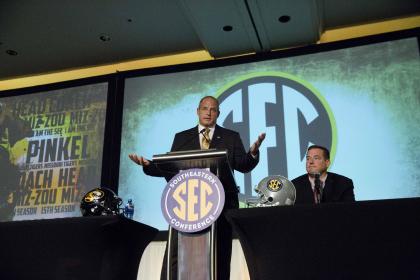This lame take shouldn't gain steam: Notre Dame should be barred from College Football Playoff
Notre Dame should have a strong team this year, with the NFL salivating over linebacker Jaylon Smith, offensive tackle Ronnie Stanley and wideout William Fuller, among others. Brian Kelly has to break in a new quarterback in Malik Zaire, but the Fightin' Irish are a legit playoff contender.
Of course, in the playoff era every team – from Alabama to Army – is, or should be, a legit playoff contender. What they do on the field of play is the only thing that matters.

Then again, both Missouri coach Gary Pinkel and Clemson's Dabo Swinney recently discounted ND not on the potential strength of the team, but because the school refuses to join a conference full-time and instead remains a throwback independent. Swinney seemed most concerned that this limited their season to 12, rather than 13 games.
"They don't have independents in NFL," Pinkel noted.
"Absolutely Notre Dame needs to be in conference or play 13 games to be in," Swinney echoed.
These are intellectually lazy opinions that can't stand up to any reasonable debate considering the state of college football scheduling.
Notre Dame will again play an ambitious schedule – Texas, Georgia Tech, USC, Stanford and so on. Oh, and at Clemson on Oct. 3, which means Swinney's comments will be resurrected then. Only six games are in South Bend. Nine opponents are from Power Five Conferences and one of the others, Navy, is no one's slouch.
Because of college football's unique nature – 128 teams chasing four playoff spots – and the disparate schedules it produces, this is a sport where quality should always be more important than quantity. It should be simple.
"Conferences" are just groupings of teams in an effort to maximize television revenue and, to a lesser extent, provide scheduling security. If Notre Dame wins all 12 of its games, or even goes 11-1 under certain scenarios, it will deserve to be considered for a spot in the playoff. If the Irish don't, they won't.
A perfect season won't merit automatic inclusion, but it also doesn't merit automatic exclusion. Last year Florida State was the 13-0 defending national champion and it was only seeded third.
That was a good thing; a sign the 13-member playoff committee is more mature than the old BCS, where record was all that mattered and, via the coaches' poll, the opinions of guys such as Pinkel and Swinney actually counted.
The inaugural college football playoff was a predictable runaway success and the fact the committee's choice for the contentious fourth spot, Ohio State, went on to win the title was a bonus for the process. Under the BCS it almost certainly would've been Alabama vs. Florida State, each of whom lost in the semifinals. It showed that additional access to prove it on the field wasn't just about the potential Boise States of the world, but the Big Ten, too.
That programs have gotten the strength-of-schedule message and are booking better non-conference dates for future seasons is a massive ancillary benefit.
Still, it was just one year and the process wasn't without debate. Baylor coach Art Briles complained about brand bias and a lack of Southern representation, which may or may not be true. The difference between Ohio State, Baylor and TCU was razor thin, though, and arguing one over the other was an exercise in going in circles. Any of the three were the correct choice. The committee made a tough call and the Buckeyes made the most of it.
More years need to go by before any conclusions can be made.
Logical flags were also raised when the committee suggested that it granted Ohio State extra credit when it blew out Wisconsin in the Big Ten title game with a third-string quarterback.
That's nice, but injuries shouldn't be a factor in any decision making because A) they are part of the game and B) they don't provide the same opportunity for teams that don't suffer injuries. Your team is on the field. That's it.
Cardale Jones was a revelation for the Buckeyes, but is it fair for TCU and Baylor to not get a chance to earn "third-string" quarterback credit just because their first stringers remained upright? Who can say how good their guys would've played? Besides, Jones wasn't a downgrade for Ohio State. His ability to stretch the field and give Ezekiel Elliott room to run made them, if not better, then at least differently as good.
And there remains some troubling comments from various committee members, the body of which still lacks intellectual diversity that maybe a younger, more data-driven member could provide. Consider new member Bobby Johnson, a colorful former Vanderbilt coach, had this to say to ESPN when asked about his new responsibilities:
"The old eye test is probably the most important. I don't want to get too involved with statistics. I like to watch games and then I'll go back and look at statistics and see what may have been the big difference in that one team winning or losing.
"It always gets down to who can execute and who can get the job done when the pressure's on. To me, that's the big thing. That's looking at the coaching staff, that's looking at the players, the kickers, everything."
Looking at the coaching staff? How about who cares who the coach is if they won enough games to deserve to be in the playoff? This is a process that demands less subjectivity, not more.
The playoff committee should have passed on Johnson when he expressed these sentiments in the job interview. There is an interview process, right?
Unfortunately they didn't. So a sport in desperate need of passionless analysis because it hasn't expanded its postseason gets someone seemingly in line with unsupportable opinions such as the "NFL doesn't have independents."
Here comes Year Two: so much progress, so many landmines still out there.
